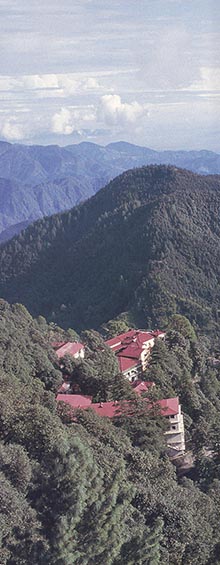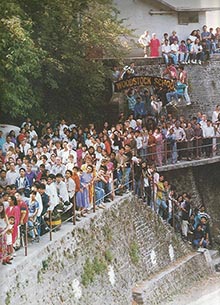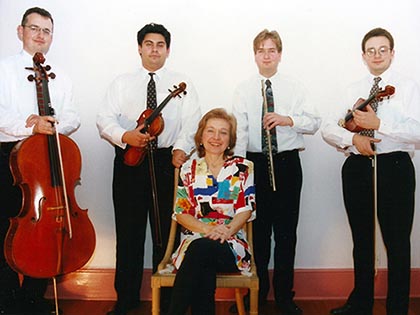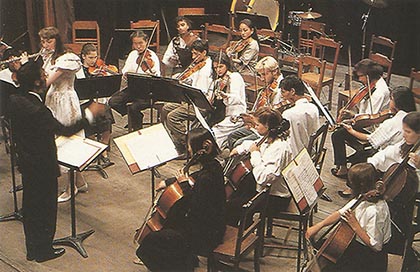
Adventures: India
TAKING SCHUBERT TO THE HIMALAYAS
THE EXPERIENCES OF A BRITISH QUINTET'S TOUR OF NORTHERN INDIA
By John Gritten, Director and Honorary Secretary of LSP
The young reporter from Agra Television's first question was not about the programme the Quintet would present at its first concert; not about the provenance of the London Schubert Players chamber orchestra; nor anything about Western classical music. It was: "What do you think of Yanni?"
It was a moment that called for tact. Arriving the day after Yanni had caused a sensation by producing three electronic musical extravaganzas behind the Taj Mahal, a casual check among the Quintet had elicited that four had never heard of the Greek-born American pianist and composer. Only the violist was able to inform the rest of us that Yanni's CDs were on sale in the UK.
We had arrived in the middle of an animated debate between Yanni's fans and his detractors. He was criticised in the Indian Press for "commercially exploiting the Taj Mahal for his self-projection." Despite the ban on the use of polluting elements within 500 metres of the Taj, roads and structures had been built for his "Freedom Concert" and one writer queried "whether a country could retain its self-respect which mobilised its army to work around the clock on steel bridges across a river, two metalled roads and other infrastructures for a concert?"
The London Schubert Players Quintet at least could plead not guilty to such claims but they were transported to their concert in the British Council Theatre in New Delhi, in police vehicles, flashing red lights and a militia escort with Sten-guns.
Take a quantum leap into the realm of fantasy. Imagine the Commissioner of the Metropolitan Police doubling up as secretary of the London Philharmonic - and, there, lies a teasing clue why five British musicians were conveyed in this manner to their concert through the teeming streets of the Indian capital.
The Northern India tour for the Quintet - piano, violin, viola, cello and flute - had been arranged through the auspices of the Delhi Symphony Society, supported by the Indian Council for Cultural Relations, the British Council New Delhi and the Chandigarh Administration’s Department of Culture.
For the Delhi programme of Beethoven, Schubert, Donizetti and Dvorak, every seat in the British Council Theatre was taken and latecomers (almost certainly against all fire regulations) sat in the gangways - a gratifying result of the efforts of the Delhi Symphony Society's extraordinary honorary secretary, the genial and protean Mr Gautam Kaul who, besides also organising sporting activities, being a documentary film-producer and critic, happens, after 35 years in the force, to be Inspector-General of Police for all India and responsible for the Militia’s armament.
It was also Inspector General Gautam Kaul's armed police/militia in battle fatigues who answered the telephoned SOS of a desperate Quintet stranded in the broiling sun outside Haridwar station, sitting on their luggage amid the bustling humanity, strolling cows and foraging monkeys. Scores of miles from its destination, the train had been forced to stop and disgorge its passengers because 4,000 strikers in a pharmaceutical factory at Rishikesh had blocked the railway line and were reportedly slashing the tyres of cars trying to run the gauntlet of their road pickets. An escort in jeeps ensured the Ouintet’s unscathed if belated arrival at its destination.
This was the apex of the tour - literally, and as a unique experience for the Quintet - a week spent about 6,500 feet up in the first range of the Himalayas, some 160 miles north-west of Delhi, from where they glimpsed (when the unseasonable lashings of hail-stones and thunder storms permitted) the first range of snow-covered peaks which step up to over 20,000 feet along India's northern border with Tibet.
Here, carved at different levels out of the side of a mountain carpeted with pines and deodars, is an international co-educational school with 450 students of over 30 nationalities, ranging from nine-year-olds to those preparing for London University GCEO and A levels or an American high school diploma - 95 per cent of whom graduate to colleges and universities worldwide.
Woodstock School, Mussoorie, Uttar Pradesh, was founded by British Officers and two American missionaries four years before Queen Victoria came to the throne and 22 years before she was proclaimed Empress of India. It was at first staffed by a group of British women members of the Society for Promoting Female Education in the East. From being a school for Protestant girls, the school passed through many vicissitudes, adapting, following the diminishing numbers of missionary and other foreign families in India, to its present international status with a strong Indian culture component and an American principal. It claims to be the oldest school of its kind in the world.
Aiming to produce "global citizens", the students actively assist in many aspects of local social and environmental work and, in 1996, took second place in the Community Service Awards, a universal competition for high schools.
Woodstock is equipped with 30 computers, a language and science laboratory, art and media studies rooms, a well-stocked library and two concert and theatre halls.
Music forms an important element in the curriculum, with some 200 students receiving individual tuition in piano, strings, woodwind and brass. The school has two orchestras - advanced music students and staff perform with the Delhi Symphony Orchestra - three choirs and three bands.
In fact, such is the music-making enthusiasm of the pupils that there is something of a crisis: a desperate need for committed music teachers, from the UK for instance, to supplement Woodstock's dedicated music staff.
During their week at Mussoorie the LSP Quintet coached students in their respective instruments - for many the first opportunity they had to participate in a professional masterclass. “I got to learn many practical skills and new techniques to improve my sound, style and speed”, was one student's verdict on the Players’ visit.
The Quintet got up in the chilly, misty, Himalayan mornings to start rehearsals with the 40-strong school orchestra at 7.40am (before the start of the normal school routine). These culminated in a concert attended by the whole school, in which the Quintet led the school orchestra's sections. The Media Centre auditorium was packed, with standing room only and students even sharing chairs.
The following evening the London Schubert Players also gave a chamber music recital after which one pupil said: "It was fantastic. Now I want to start learning the cello."
Pianist Anda Anastasescu, the LSP's artistic director, found her Woodstock pupils "as responsive and talented as my students in the Guildhall School of Music and Drama in London", where she taught for six years in the early '80s. "They were eager for any opportunity to attend our master classes, to listen to whatever was for them fresh advice for improving their technique and musical knowledge. Equally keen were the young piano teachers – from Canada and the US".
They gave up a lot of their precious free time at breaks and the weekend to have intense discussions ranging from what is the best approach to practising and playing arpeggios, to preparing a Bach invention or a Mozart sonata and how to deal with difficult students.
Violinist Daniel Bhattacharya was full of admiration for the head of music, violin teacher and the orchestra’s conductor, Ravi Arthur, a cellist whose own musical education had started with the guitar. "I found him inventive, making the most of the limited resources at his disposal. His students were having to try to make music on instruments that had seen better days. But they were eager to learn".
Cellist David Robinson was "very impressed by the high standard of playing. I found the atmosphere relaxed and an enthusiasm for music-making. Their openess to music of all cultures reminded me of Dartington International Summer School".
The Himalayan venture was not just a one-way experience. The London Schubert Players would be the first to agree with the Yehudi Menuhin quotation which has been adopted as a motto by the Delhi Symphony Society: "Music is so close to humanity that one must go to humanity to develop oneself as a musician".




